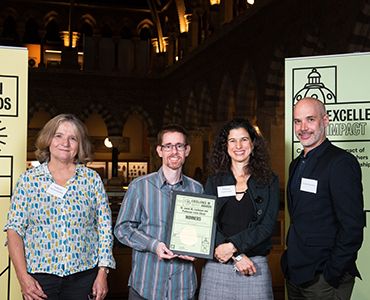Research-based child abuse prevention and parenting programme to support lifelong health
Researchers at the University of Oxford, led by Professors Lucie Cluver, Frances Gardner and Dr Jamie Lachman, have developed a suite of evidence-based, non-commercialised, open-access parenting programmes: Parenting for Lifelong Health (PLH).
 Professor Frances Gardner (left), Professor Lucie Cluver (centre right), and Dr Jamie Lachman (right).
Professor Frances Gardner (left), Professor Lucie Cluver (centre right), and Dr Jamie Lachman (right).(Credit: John Cairns)
With more than one billion children internationally at risk of abuse, the programme has evolved to enable it to reach more people in more places. In addition to delivery through in-person facilitation, tip sheets and online resources have been created and new digital delivery methods have been developed, which could be introduced as early as the end of 2024. These digital parenting interventions - which include an app-based version of the PLH programme, a facilitator-moderated online chat for parents, and a text-based delivery - are currently going through rigorous testing.
The research underpinning the programme was funded through ERC Starter and Consolidator Grants and a Proof-of-Concept Grant. The team were one of the five recipients of the inaugural Horizon Impact Award in 2019, as well as the UK Research and Innovation ESRC Impact Award in 2021.
The PLH programme has been adapted for a range of crises, from the COVID-19 pandemic, in which 1.4 billion children were out of school, to the conflict in Ukraine, the floods in Pakistan, the earthquakes in Turkey-Syria, and most recently, the conflict in Sudan. To date, 17 tip sheets have been created, each one with different, evidence-based information, tailored for particular situations – from how to keep calm and manage stress to how to prevent child trafficking and child sexual abuse.
These programmes were developed and rigorously tested through a collaboration between the World Health Organisation, Stellenbosch University and the University of Cape Town in South Africa, and the Universities of Oxford and Bangor, as well as the United Nations’ children’s organisation, UNICEF.
Through further funding from the LEGO Foundation, Oak Foundation and UKRI Global Challenges Research Fund, the team was able to create the online resources for use by parents during the COVID-19 pandemic. The team worked in partnership with the World Health Organisation (WHO), UNICEF, other UN agencies, academic institutions and organisations and the materials reached more than 210 million people internationally. Since then, the team has adapted resources, and created new translations to enable families to benefit wherever they are needed.
Project team members
Professor Lucie Cluver, Department of Social Policy and Intervention, Nuffield College
Dr Jamie Lachman, Department of Social Policy and Intervention, Wolfson College
Professor Frances Gardner, Department of Social Policy and Intervention, Wolfson College
Funders: ERC Starter and Consolidator Grants and a Proof-of-Concept Grant, Horizon Impact Award in 2019, UK Research and Innovation ESRC Impact Award in 2021 and Global Challenges Research Fund,
LEGO Foundation, Oak Foundation